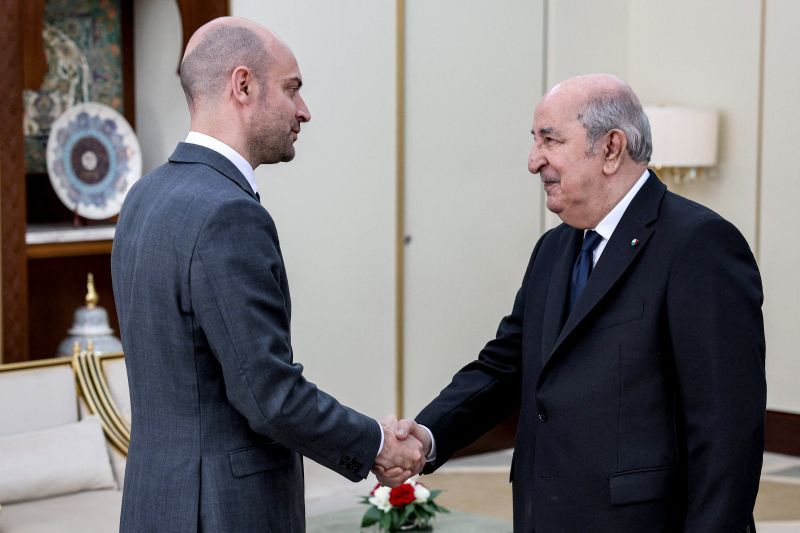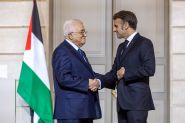- Home
- Middle East
- France-Algeria: Has the Power Dynamics Approach Failed?

This photo released by the French Ministry of Europe and Foreign Affairs (MEAE) shows French Minister of Foreign Affairs Jean-Noël Barrot (L) being received by Algerian President Abdelmajid Tebboune in Algiers on April 6, 2025. ©Philemon Henry / AFP
After months of diplomatic tensions, Paris and Algiers have shown their willingness to turn the page. The visit of the French Minister of Foreign Affairs to Algiers marks the official resumption of bilateral cooperation, which had been suspended since the summer of 2024 due to differences over Western Sahara, migration policy and freedom of expression.
Eight months of diplomatic tensions led France and Algeria to initiate a rapprochement, formalized by the visit of French Minister Jean-Noël Barrot to Algiers on April 6.
The relations between France and Algeria, shaped by a painful colonial history, have always been marked by ups and downs. However, the crisis that erupted in 2024 reached unprecedented proportions. In July, French President Emmanuel Macron recognized Morocco’s sovereignty over Western Sahara, sparking anger in Algiers, a long-time supporter of the Polisario Front. This independence movement, supported by Algeria since the 1970s, calls for the self-determination of Western Sahara, a territory largely controlled by Morocco but considered non-autonomous by the UN. Algeria then denounced a “change in doctrine” by Paris, contrary to international law, and recalled its ambassador.
This decision was compounded by an atmosphere of mistrust fueled by disagreements on sensitive issues. Migration cooperation, unilaterally suspended by Algeria, is one example: Algeria had refused for months to issue the necessary consular passes for the expulsion of irregular Algerian migrants from France. This blockage was heavily criticized in Paris, especially after the attack in Mulhouse in February 2025, carried out by an Algerian national under a deportation order (OQTF).
Retailleau, the Final Straw
In this already tense atmosphere, the statements by French Minister of Interior Bruno Retailleau escalated the situation. In January 2025, following the Mulhouse attack, he publicly accused Algeria of not “playing the game” in security cooperation, going so far as to call Algeria a “country complicit by passivity.” These comments caused an uproar in Algiers, where they were seen as an unjust stigmatization and an attempt to shift the responsibility for French insecurity onto a foreign partner. Algerian Minister of Foreign Affairs Ahmed Attaf then denounced a “hostile campaign” by certain French political circles.
These tensions were further fueled by other French political figures, including Gérard Larcher, who called for a “complete overhaul” of the Franco-Algerian relationship, which he deemed “imbalanced.” Minister of Foreign Affairs Stéphane Séjourné adopted a more measured stance, stating in March that Paris wanted to “resolve tensions with demands, but without provocation.”
The Boualem Sansal Affair
Among the most inflammatory elements of this diplomatic crisis was the Boualem Sansal affair, which has long exacerbated relations between Paris and Algiers. On March 27, the Franco-Algerian writer was sentenced to five years in prison and a fine of 500,000 dinars (about 3,470 euros) by the Dar el-Beida court near Algiers. Arrested in November 2024, he had been in provisional detention since then.
Algeria accused him of making controversial remarks in the far-right French magazine Frontières, notably mentioning the western part of Algeria's potential belonging to Morocco—a highly sensitive topic.
Charged with undermining state security, territorial integrity, institutional stability and even espionage for foreign parties, the writer is also suspected of transmitting “sensitive security and economic information.” While a life sentence was ruled out, the severity of the sentence was perceived in France as a hostile gesture, further deepening an already entrenched crisis.
A Cautious but Determined Revival
Jean-Noël Barrot's visit to Algiers on April 6, 2025, took place in this context. The goal is to restore a direct channel of dialogue and relaunch suspended cooperation. The French Minister of Foreign Affairs met for more than two hours with his counterpart Ahmed Attaf, he was then received by President Abdelmadjid Tebboune.
At the conclusion of this visit, the two countries announced the “full resumption of bilateral cooperation in all areas,” including migration, economy and security. Barrot stressed a “prompt” and “unconditional” revival. For his part, President Tebboune declared that “the curtain has been lifted” on this crisis. Behind this desire for reconciliation lie mutual interests. France, facing growing migration and security challenges, needs Algeria's cooperation. As for Algeria, it seeks to restore a form of respect in the bilateral relationship, particularly in terms of memory and regional sovereignty.
However, to achieve lasting stability, Paris and Algiers will need to go beyond symbolic gestures and engage in substantive work on the underlying causes of tensions: the memory issue, migration policy, regional stability and mutual respect.
Read more




Comments